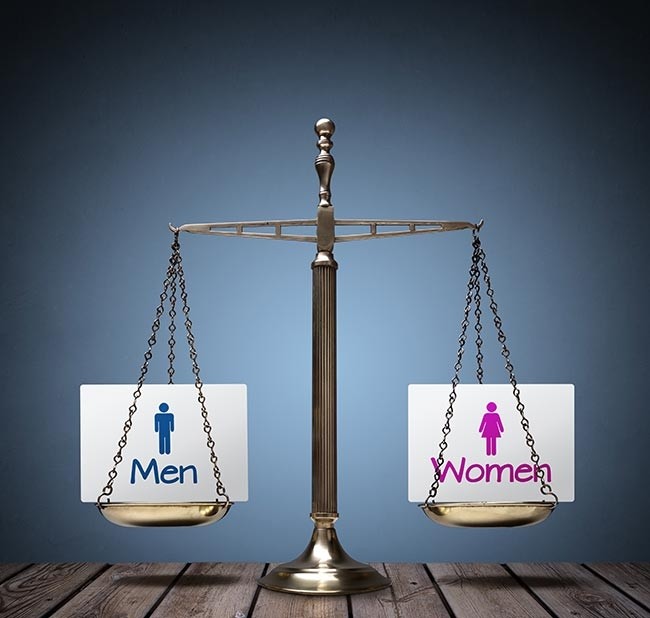We know that the two sexes are different in so many ways, so why should this alter when it comes to their jobs and the perks they look for from a new role?
A new study by Coople has delved into this subject, asking more than two thousand men and women what it was that each valued from their role/career and what they look for when changing position.
Coople found that men placed pay and perks at the top of their list to negotiate with employers, and as the motivation behind job choices. Travel opportunities were also on men’s wish lists, whilst less than half of women placed emphasis on this in new roles. For them, having a suitable work/life balance was the issue that won out, alongside opportunities to progress. For women, it was hugely important that the work they did ‘made a difference’ in some way.
That’s not to say a good work/life balance wasn’t important to men; 55 % cited this as significant, compared to 60% of women. The issue of pay, whilst being top priority for men, with 70% confirming this, 66% of women agreed, which doesn’t represent a huge difference.
Similarly, 30% of men admitted spending more time than expected at the office. This wasn’t a confession that set the male sex apart, as 26% of women also said the same. A tenth of the men putting in more hours complained that it affected their sex lives – though this could have been one issue that divided the genders, eight percent of women made the same complaint.
So, are the sexes really that different? Jacques de la Bouilleries, Coople’s Managing Director, said, “Whilst the differences cited by men and women in what they want from a job are interesting, it’s far more revealing to note that both men and women have the same grievances with their jobs. In 2017, employers need to start truly recognising the value of flexible working and the role it plays in increasing employee happiness and morale.”
What about the job hunt itself….are men more ruthless and go-getting, as stereotypes often portray? Do women typically sell themselves short?
A study by MedReps showed perhaps bigger differences in gender when it came to applying for jobs. Their research found that men didn’t place much significance on the words used in adverts, yet in contrast, women were often put off a role if the job description featured words such as ‘assertive’ or ‘aggressive’. They were far more likely to respond to words that aligned with their typical requirements of a role, i.e. ‘responsible’, or ‘dedicated’.
MedReps’ research also found that men were much more likely to use social media platforms and tools to find their next role than female job-seekers. And, contrary to popular belief, perhaps, when it comes to appearances alone, employers are ‘twice as likely’ to hire a man than a woman.
Recruiters can take what they choose from these findings, but it’s clear that some aspects of recruitment website design careers universally mean a lot to us, whichever sex we are. That doesn’t mean to say there aren’t differences. For example, job-hunting on Mars looks to be worlds away from job-hunting on Venus.
We know that the two sexes are different in so many ways, so why should this alter when it comes to their jobs and the perks they look for from a new role?
A new study by Coople has delved into this subject, asking more than two thousand men and women what it was that each valued from their role/career and what they look for when changing position.
Coople found that men placed pay and perks at the top of their list to negotiate with employers, and as the motivation behind job choices. Travel opportunities were also on men’s wish lists, whilst less than half of women placed emphasis on this in new roles. For them, having a suitable work/life balance was the issue that won out, alongside opportunities to progress. For women, it was hugely important that the work they did ‘made a difference’ in some way.
That’s not to say a good work/life balance wasn’t important to men; 55 % cited this as significant, compared to 60% of women. The issue of pay, whilst being top priority for men, with 70% confirming this, 66% of women agreed, which doesn’t represent a huge difference.
Similarly, 30% of men admitted spending more time than expected at the office. This wasn’t a confession that set the male sex apart, as 26% of women also said the same. A tenth of the men putting in more hours complained that it affected their sex lives – though this could have been one issue that divided the genders, eight percent of women made the same complaint.
So, are the sexes really that different? Jacques de la Bouilleries, Coople’s Managing Director, said, “Whilst the differences cited by men and women in what they want from a job are interesting, it’s far more revealing to note that both men and women have the same grievances with their jobs. In 2017, employers need to start truly recognising the value of flexible working and the role it plays in increasing employee happiness and morale.”
What about the job hunt itself….are men more ruthless and go-getting, as stereotypes often portray? Do women typically sell themselves short?
A study by MedReps showed perhaps bigger differences in gender when it came to applying for jobs. Their research found that men didn’t place much significance on the words used in adverts, yet in contrast, women were often put off a role if the job description featured words such as ‘assertive’ or ‘aggressive’. They were far more likely to respond to words that aligned with their typical requirements of a role, i.e. ‘responsible’, or ‘dedicated’.
MedReps’ research also found that men were much more likely to use social media platforms and tools to find their next role than female job-seekers. And, contrary to popular belief, perhaps, when it comes to appearances alone, employers are ‘twice as likely’ to hire a man than a woman.
Recruiters can take what they choose from these findings, but it’s clear that some aspects of our careers universally mean a lot to us, whichever sex we are. That doesn’t mean to say there aren’t differences. For example, job-hunting on Mars looks to be worlds away from job-hunting on Venus.

